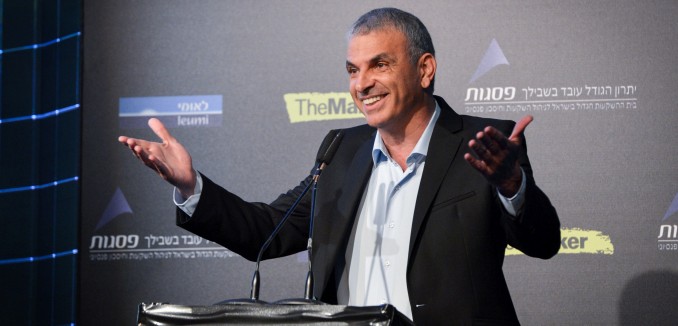In one of the most hotly-contested elections in recent memory, with possibly the highest voter turnout in nearly two decades, Israelis appear to have surprised previous polls by streaming away from smaller parties to strengthen both Likud and the Zionist Union.
Yet despite the apparent shift from the last set of polls released late last week, what still remained clear is that of the 10 parties that cleared the threshold for representation in the Knesset, only Moshe Kahlon’s Kulanu party emerged as a genuine kingmaker in the intensive coalition-building process that is to follow.
From early on, Kahlon has aimed his platform at what he perceives as the precise center of the Israeli political spectrum—hawkish on Iran, tough on terror, and an economic policy that could be called “social capitalism,” appealing to voters concerned about the standard of living but building on a pro-market record to achieve it.
In his campaign, moreover, he worked hard to differentiate himself from both Likud and the farther-right parties—signalling a willingness to join a coalition with either of the two big parties.
The result is that in the wake of the elections, it seems extremely unlikely that a coalition can form without Kulanu. The other possible swing parties—Shas, United Torah Judaism, and Avigdor Lieberman’s Israel Beiteinu—all are so thoroughly identified with the right that it would be difficult to see a stable coalition forming with them and the Zionist Union’s partners. Shas and UTJ, both Orthodox, have already spoken in favor of Prime Minister Benjamin Netanyahu and the Likud, and would be hard to match up with the ardent secularists of Yesh Atid and Meretz. Lieberman’s smaller party, while secular, is so hawkish as to make it hard to imagine sharing a foreign policy with Meretz—or being dependent on the Joint (Arab) List for the stability of the coalition.
In fact, the only alternative to Kulanu at this stage would be the formation of a national unity government with both Likud and the Zionist Union—an option that would have many advantages to it given the challenges ahead, but would be very difficult to square with each party’s impassioned promises to their voters.
The end of the voting marks the end of the first phase of the Israeli election process. Starting tomorrow, parties will make recommendations to President Reuven Rivlin as to which candidate they prefer as Prime Minister, and Rivlin will tap either Zionist Union leader Isaac Herzog or Netanyahu to form a government. Whoever it is will have a month to pull it together. If they fail, Rivlin will tap the other—or send Israel back to another round of elections.
During the coming days and weeks, it seems, the most important conversations will be the quiet ones that Likud and Labor each have with Kulanu—and with each other. If Kahlon’s demands are too high, we may well see the emergence of a unity government, possibly better equipped than any other to take on the challenges facing Israel in the coming years.
[Photo: Flash90]




